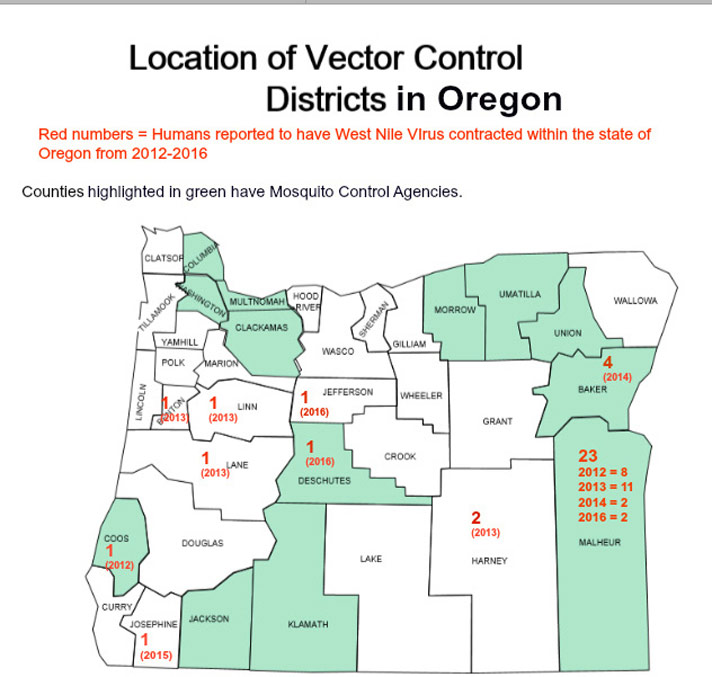Love Thy Pollineighbor – May 2017
They’ve been around for more than 100 million years. They’re most active at 80°F and unable to function below 50°F. They can sense the lactic acid and carbon dioxide from an animal’s breath up to 100 feet away. The females beat their wings 500 times per second producing a piercing high-pitched whine that unmistakably and annoyingly announces her presence.
Considered by most to be an aggravating nuisance and by many a disease-carrying adversary, mosquitoes in their adult and larval stages serve an important purpose in ecology—a food source to frogs, small fish, aquatic beetles, dragonflies, damselflies, bats, birds, turtles, and even other mosquitoes. Adult mosquitoes nectar on plants and are pollinators.
Of the more than 2500 species of mosquitoes worldwide, about 50 are found in Oregon. Very few species prey on humans, and, according to Oregon Department of Fish and Wildlife, less than 1% of all mosquitoes carry the West Nile Virus (WNV). Humans are not the first choice for female mosquitoes looking for a protein snack. Wild birds are the primary hosts.
Zika does not currently exist in the northwestern U.S., and in Oregon from 2012-2016 there have been only 36 reported cases of humans infected with WNV. There were zero human infections 2010-2011, and one human death—a person with a compromised immune system—was reported in 2006 according to The Oregonian. Approximately 80% of people infected with WNV will show no symptoms. Up to 20% infected will display flu-like symptoms, and less than 1% develop serious illness.
The graphic shows which counties in Oregon have Vector Control agencies and the incidence of WNV in humans from 2012-2016.
The data show that having or not having a spraying program doesn’t appear to impact case rates. So what are the other valid reasons for spraying toxic substances on our wildlife?
According to the Xerces Society for Invertebrate Conservation, “spraying pesticides is the knee-jerk reaction to mosquitoes…such simple approaches rarely work. Data from the last 150 years illustrate that relying on broad-scale insecticide spraying is not effective at managing mosquitoes. Insecticides can also have profound impacts on the natural world, harming insects that are food for birds and fish as well as the bees that pollinate our food.”
Monarch butterfly caterpillars have a significantly lower survival rate when milkweed (host plant) is sprayed for mosquitoes. Pesticide applications are also killing off mosquito predators that would otherwise keep populations under control. There are over 125 mosquito species with documented resistance to one or more insecticides, according to the CDC. Most importantly, adulticides have not been shown to reduce WNV incidence.
Mosquito management insecticides are linked to human health risks like cancer, according to Xerces. The nonprofit, Beyond Pesticides also highlights the public health hazards associated with widespread pesticide exposure. Making informed decisions about the impacts of mosquito-borne illnesses versus the synthetic pesticides used to control them is vitally important to your health and that of the wildlife in your community.
Xerces Society states that “to stem the tide of harm caused by mosquito-borne diseases, it is vital that we act strategically—and take an approach informed by science, not fear. A century and a half of experience clearly demonstrates that indiscriminate use of insecticides throughout our communities is not the answer.”
Jackson County’s taxpayer-funded Vector Control, in addition to finding and controlling mosquito larvae, (most effective control) sprays throughout the county from May to September, between the hours of 3:00-6:00am with an insecticide, DeltaGard, that is “extremely toxic to fresh water and estuarine fish and invertebrates” and “highly toxic to bees” according to its label. While the honey bees may seem to be safely ensconced in hives between these hours, our wild male bees are outside sleeping in flowers along the very neighborhood streets and roadways that are sprayed. Center for Biological Diversity released a report in March 2017 with key findings: 347 of the 1437 native bee species are imperiled and at risk of extinction, blaming habitat loss and heavy pesticide use.
Jackson County residents can protect pollinators by signing up for the no-spray list so no adult mosquito control applications will be made within three hundred feet of their property unless mosquito borne disease is documented in the area. You can also sign-up for email spray notification to track spraying throughout the summer: www.jcvcd.org/no-spray.
By following some of the tips here and coming up in June’s article, you can create backyard habitat that repels mosquitoes without causing harm. Together we can minimize potential problems while protecting the health of our pollinators, wildlife, pets, and families.
Tip #1: Eliminate all potential breeding areas—any place that water collects in your yard: Mosquitoes can breed in puddles the size of dimes, so restricting breeding habitat is key to providing long-term control over mosquito populations. You can do this by removing standing water, which would eliminate the eggs and/or larvae.
Check your yard after each rain
Remove standing water from old tires, buckets, flower pots, drains, and anywhere that it pools like on tarps covering woodpiles
Unclog gutters
Fix leaky hoses and faucets
Refresh birdbaths or dog bowls weekly
Next month’s article will focus on tips for DIY repellent, simple preventative solutions, attracting mosquito predators, the importance of reporting dead birds, and a surprising benefit of coffee.

 When she’s not working, volunteering, fiddling about the garden, photographing nature, being a pollinactivist, blogging about social and environmental justice, or pawning her eco-children’s book, Kenda, a former Monarch butterfly docent, gets her kicks hanging with her husband, her dog, and the pollineighbors.
When she’s not working, volunteering, fiddling about the garden, photographing nature, being a pollinactivist, blogging about social and environmental justice, or pawning her eco-children’s book, Kenda, a former Monarch butterfly docent, gets her kicks hanging with her husband, her dog, and the pollineighbors.
Great synthesis of the skeeter situation. I look forward to reading next month’s article. Thank you!
Splendid article. Good to see that you mention the awful health effects of these insecticides on humans. One effect to add is on the human hormone system, as Deltagard insecticide is a known hormone disruptor at levels in the parts per billion, This of course affects babies, children and pregnant and nursing mothers moreso, but all humans to be sure. For what? Only 1% of these aerosol sprays reach the target organism, mosquitos. So 99% reaches other organisms, including us. Makes me wonder who really is the target organism.
Looking forward to the next article. Coffee? It’s not a local plant, but maybe it repels mosquitos. I wonder if peppermint does? I have a thriving patch in my raised bed.